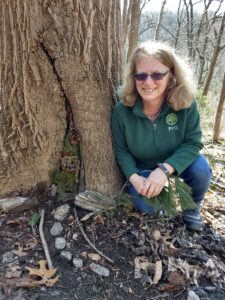
The PHS’s Mindy Maslin, founder of Tree Tenders, is being honored for helping plant 20,000 trees across the region.
Philadelphia has a bold plan for reforesting the city, making sure 30% of our city is blanketed under a canopy of trees, which will go a long way to mitigating heat waves and cooling our city’s rapidly changing climate. It’s also an environmental justice plan, as– no surprise– economically challenged portions of the city have fewer trees than more advantaged neighborhoods.
Mindy Maslin supports this ambitious goal. As the founder and director of Tree Tenders, an important program of the Pennsylvania Horticultural Society (PHS), Mindy has been responsible for planting some 20,000 trees across the region while training 5,600 tree care volunteers since forming the program in 1991. Can you imagine that: 20,000 trees?
To honor this extraordinary work, we are thrilled to present our 16th annual Henry Meigs Environmental Leadership Award to Mindy, as she not only believes planting trees is “a powerful way to enhance the health, resilience, and quality of our neighborhoods,” but has inspired thousands of citizens to make a difference in their community.
The Germantown resident is being given the award, our highest honor, in a virtual ceremony set for Thursday, November 18 at 7:00 p.m. Joining Mindy for a conversation on “The Urban Forest” are Tree Tenders and community leaders Sharrieff Ali and Gabriella Paez, along with Jack Braunstein, manager of the Tree Philly program, the group charged with implementing this important goal. The event is free; one can register on our website.
Tree Tenders is one of the oldest volunteer urban tree stewardship programs in the country, and has inspired similar programs throughout Pennsylvania and across the U.S. Locally, Tree Tenders graduates come from at least 100 active volunteer groups in the city and surrounding counties. Since this work is done by volunteers, the city has saved hundreds of thousands of dollars by not having to hire professional arborists to do the planting or the initial care.
Mindy sees the social benefits of trees and is committed to addressing the inequities in tree canopies. Her PHS tree team has identified an uneven distribution of tree canopy that corresponds with high-density, low-income, and even high-crime neighborhoods. This latter point is important: there is less crime and, this is extraordinary, a lower murder rate in neighborhoods shaded by trees.
Mindy agrees that “all neighborhoods deserve to benefit from trees, for heat island abatement, air quality improvement, stormwater sequestering, and the softer gifts of mood enhancement and community building.” In response, Tree Tenders has a tool for prioritizing planting in low-canopy neighborhoods. In fact, studies show that people view urban residential spaces with trees as more attractive, safer and more appealing. “If you plant trees,” Mindy says, “it encourages people to go outside, meet their neighbors and build relationships; in turn, it fosters community pride which ultimately makes neighborhoods safer.”
In her efforts to diversify the program, she has connected with local institutions to bring the training directly to underserved neighborhoods. “Working within the community with local institutions and local tree champions is a critical part of the Tree Tenders model. They provide education and tools. But the onus is on the neighborhood Tree Tenders group to activate their neighbors to plant trees—it’s neighborhood-based citizen stewardship.”
“You need to convince people who might be reluctant to plant a tree on their property why taking this action will improve their lives,” she says. And that happens at the neighborhood level where locals become advocates in their own community. Once you plant a tree, it still needs care to grow—a critical part to a tree’s survival. That’s where the stewardship piece comes in. The Tree Tenders program provides a framework to check on the trees and neighbors to make sure that the proper care is given.
PHS’s Chief of Healthy Neighborhoods Julianne Schrader-Ortega notes, “Mindy is an integral part of the vitality of PHS’s mission to use horticulture in advancing the health and well-being of citizens in our local region and we’re pleased that Mindy is receiving the Meigs award as public recognition of the large impact she has had on the environment and on people’s lives.”
Mindy is honored to be receiving this from “an institution of the Schuylkill Center’s caliber. It is a huge professional accomplishment. For decades, Tree Tenders and the Center have created joint programs that have served thousands of people in the region; our collaborations continue to be a highlight in my career. This award from such a valued partner is truly extraordinary.”
In turn, I’m so happy my Center is honoring her, as few people have planted more trees in the region than she has, and tree planting is such a powerful act, for all the reasons noted above.
The award celebrates area leaders who symbolize the spirit of integrity and vision of Henry Meigs, one of our founders, who served on our board for 40 years until passing away in 2005. His family established the award shortly thereafter, and past honorees include former governor Ed Rendell for his work on Growing Greener, environmental artist Stacy Levy, whose extraordinary art graces locations across the region, and Jerome Shabazz, founder of the Overbrook Environmental Education Center in West Philadelphia.
Hope you’ll Zoom in with us.
By: Mike Weilbacher, Executive Director
